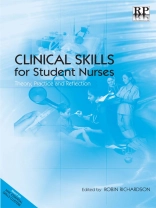Introduction
Acknowledgements
Author Biographies
PART 1 COMMUNICATION
1 Interpersonal skills
Communication skills
Dementia and interpersonal skills
Dealing with aggression and violence
2 Assessment of patients
Introduction
What is assessment?
Patient assessment
Care planning
Implementation
Evaluation
3 Transferring and discharging patients
Patient transfers
Patient discharges
4 Pain management
The aetiology of pain
Types of pain
Symptoms of pain
Pain management
The treatment of pain
Non-pharmacological options for pain management
5 Venepuncture and cannulation
Introduction
The structure of veins
The circulatory system
Important considerations when performing venepuncture and cannulation
Venepuncture and cannulation
PART 2 PERSONAL CARE
6 Personal hygiene
Introduction
Preparation for a bed bath
Hair care
Nail care
Oral care
Immersion bath
Bed making
7 Catheterisation (male and female)
Introduction
What is urinary catheterisation?
Male catheterisation
Female catheterisation
Catheter care
Removal of urinary catheters
8 Bowel care, suppositories and enemata
Introduction
Monitoring bowel function
Administration of suppositories
Following the administration of suppositories
Enemata
Administration of enemata
Following enema administration
9 Skin integrity assessment and pressure area care
Introduction
How and why do pressure ulcers develop?
Pressure ulcer risk assessment
Preventing the development of pressure ulcers
PART 3 CARE AND COMPASSION
10 Nutritional support, hydration and fluid balance
Overview of nutritional issues
Nutritional assessment
Encouraging and supporting dietary intake
Enteral nutrition
Hydration and fluid balance
11 Moving and handling
Overview of manual handling practice
Legislative and professional aspects of manual handling practice
Consideration of the manual handling activities that Mrs Smith requires
Moving Mrs Smith
Bed manoeuvres
12 Breaking bad news
Introduction
What is bad news?
How to break bad news
13 Last offices
Introduction
Last offices
PART 4 MEDICINE MANAGEMENT
14 The legal, ethical and professional aspects of medicines management
Introduction
The legal aspects of medicines management
Professional practice
The capacity to consent
Record-keeping
15 The administration of medicines
Introduction
General safety issues
Basic pharmacology
Drug calculations
Routes of drug administration
Complementary medicine
16 Medication errors, drug storage and controlled drugs
Introduction
Medication errors
The storage of medication
Controlled drugs
PART 5 CARE MANAGEMENT
17 Observations
Introduction
Observations
18 Early Warning Scores – the early detection of deterioration
What is the Early Warning Score?
Calculating the EWS
EWS – taking action
The outreach team
Documentation
Observations in today’s working environment
19 Airway management and life support
Airway management
Basic life support
Advanced life support
20 Pre- and post-operative care
Introduction
Pre-operative care
Post-operative care
21 Specimen collection and infection control
Introduction
Infection control
Specimen collection
Appendix: Essential Skills Clusters (ESCs) for Pre-registration Nursing Programmes
List of abbreviations
Glossary
Index
Jadual kandungan
Introduction
PART 1 COMMUNICATION
1 Interpersonal skills
2 Assessment of patients
3 Transferring and discharging patients
4 Pain management
5 Venepuncture and cannulation
PART 2 PERSONAL CARE
6 Personal hygiene
7 Catheterisation (male and female)
8 Bowel care, suppositories and enemata
9 Skin integrity assessment and pressure area care
PART 3 CARE AND COMPASSION
10 Nutritional support, hydration and fluid balance
11 Moving and handling
12 Breaking bad news
13 Last offices
PART 4 MEDICINE MANAGEMENT
14 The legal, ethical and professional aspects of medicines management
15 The administration of medicines
16 Medication errors, drug storage and controlled drugs
PART 5 CARE MANAGEMENT
17 Observations
18 Early Warning Scores – the early detection of deterioration
19 Airway management and life support
20 Pre- and post-operative care
21 Specimen collection and infection control
Appendix: Essential Skills Clusters (ESCs) for Pre-registration Nursing Programmes
Mengenai Pengarang
Originally from County Durham, Robin began his academic career at Royal Holloway College, University of London in 1984, graduating in 1987 with a Bachelor’s degree in Human Physiology and Zoology. On graduation, Robin began his nursing career at the South Lothian College of Nursing and Midwifery in Edinburgh, eventually qualifying as a Registered General Nurse. On qualification Robin worked as a Staff Nurse at the Royal Free Hospital in London in several specialties including ENT, orthopaedic/trauma and general surgery before moving to St Mary’s Hospital in Paddington in 1994 to specialise in vascular surgery. In 1997 Robin became a Nurse Practitioner within the St Mary’s group of hospitals and commenced his teaching qualification at Thames Valley University – graduating with a master’s degree in Learning and Teaching in Healthcare in 2002, by which time he was working as a full time lecturer at TVU. In 2003 Robin moved to the University of Central Lancashire, in Preston, where he is currently the Executive Dean of the Faculty of Allied Health and Wellbeing.












